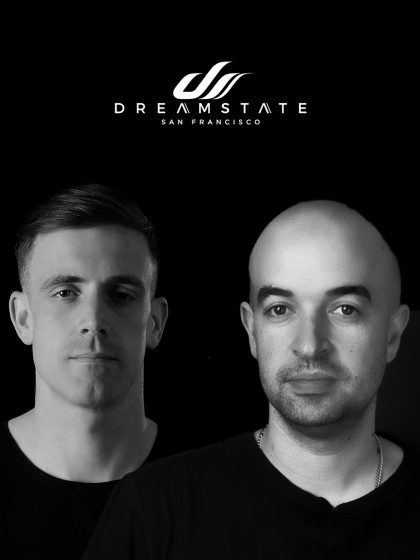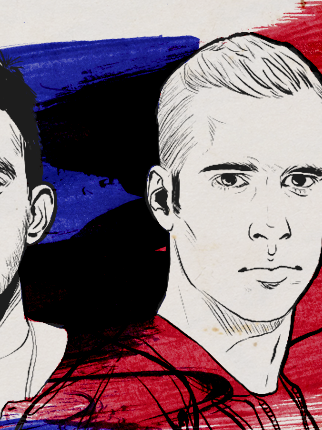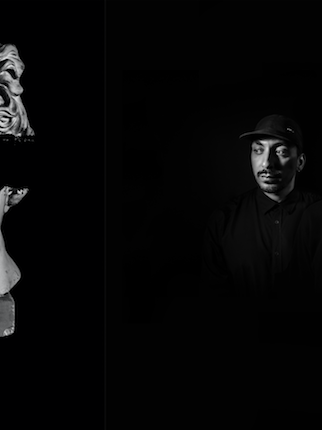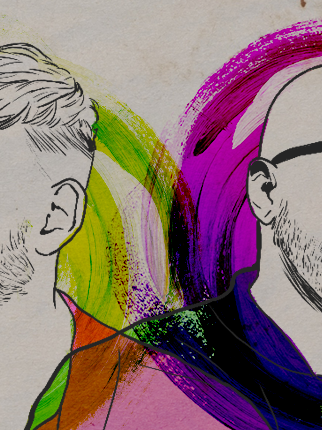Head to Head: Optical vs. Matrix
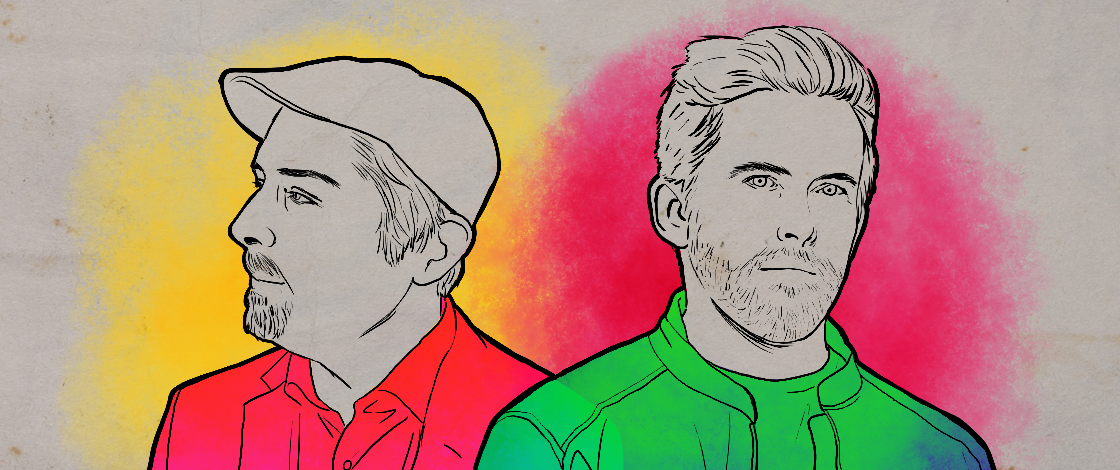
The Head to Head series explores the minds of two genre greats in one in-depth and personal interview together.
If you’re ever at an event where both Optical and Matrix are performing, you’re guaranteed to hear the following questions from both of them: “Is my brother here yet?” “Have you seen my brother?” “Do you know where my brother is?” When they do finally find each other, it’s like a family reunion they’ve been anticipating for a long time, which is odd, considering they both live in their hometown of London. Once together, a love fest ensues immediately between the two, and just as quickly, each one of them will declare the other’s talent superiority.
In case you weren’t aware, Optical and Matrix, two of the longest-standing powerhouses in drum & bass, are full siblings. Both brothers are standard bearers as well as trailblazers in the genre. Optical is best known as one half of perennial D&B duo Ed Rush & Optical, creators of the genre classic Wormhole, originators of the neurofunk style, and early pioneers of techstep. Brother Matrix operates as part of drum & bass duo Matrix & Futurebound, purveyors of family-friendly D&B that’s as chart-topping as it is dancefloor-burning.

Optical has recently released his hefty two-part retrospective compilation album, 20YearsofOptical, on his seminal Virus Recordings imprint, cofounded with lifetime partner in crime, Ed Rush. Matrix is celebrating his latest single with Futurebound, the aptly titled “Fire” featuring Max Marshall.
While Optical and Matrix represent the full spectrum of drum & bass history, as well as the genre’s future sounds, these two began their musical expedition, side by side, in their parents’ home during their tween years.

How did you both get started with music production?
Matrix: My brother and I got into production at the same time. We were given some games for our Commodore Amiga computer that we played as kids; there was a really basic music program on there. We started messing with that, and it was the first taste of producing music in my early teens.
Optical: OctaMED, the music program’s called. We used to make music in our mum’s house before we ever had any records out. We are less than two years apart, so there was a bit of competition going on between us. Who is going to get the first record out? Who’s going to do this? Who’s going to do that? But it was relatively friendly.
Matrix: We were both, to some extent, feeding off each other in terms of how to figure things out. There weren’t as many established ways to learn stuff back then. I think maybe that’s why music was more experimental. People were finding their way, treading their own path, because that’s all you were able to do.
How did the shift into drum & bass happen?
Matrix: We used to go to lots of cool raves in the English countryside. That early rave music was sort of house music, but people started putting breakbeats into it. Gradually, the house beats went into the background and the breakbeats took over. That’s how I saw the birth of drum & bass, but when we started doing it, no one had coined the term. It’s hard to explain how we both were drawn to this specific form of music. When I first started hearing those records, it was super exciting and unlike anything I’d ever heard. It had a unique energy about it.
Optical: It was the latest thing coming out at that time, so we all wanted to get involved in it because it was new. Techno and four-to-the-floor music had been going since the early days. I think the drum machine had a lot to do with the sound. There not being that much power and technology back in the ‘80s, you could only make a kick drum or a snare, one simple one for each track. By the time you got to ‘92/‘93, the equipment was allowing you to use a lot more samples, so you could use breakbeats properly. With the sampler, you had the ability to chop up the beat into 15 different pieces and sculpt it a bit.
How come you haven’t done more collaborations together?
Optical: We don’t get along in the studio. He wants to go in the direction I never want to go in, and vice versa. There’s always an argument; even when we both tried really hard, we just didn’t agree. We were asked to do a single together by one of the major labels a long time ago, and we ended up having to do one side each. In my eyes, he’s always a bit of a softie when it comes to music. He probably thinks I’m totally unsubtle. He’s definitely opinionated, and so am I.
Matrix: When it comes to our music, we’re control freaks. We could never fully agree which way to say things, which is why things we started never got finished. When we were younger, there was that little bit of brotherly rivalry going on in the background as well. We’re old enough to be over that. Now that our music is so different, it might actually be more of an interesting collaboration, because it will be coming from very different angles.
How did the sonic shift into occupying such different spaces in drum & bass happen?
Matrix: If you look at something I did on the Sleepwalk album (2000) and you look at what I’m doing now, it’s like two completely different people. But if you look at all the various stuff in between, you can see the progression. I started working with this guy Danny J years ago. He was a super amazing musician, in the traditional sense. He was classically trained and knew everything about music theory. I learned a lot from him. [A] lot of [the early music we did] was about the general mood, and the soundscape, and making things sonically interesting; that’s where the heart of the record was. It wasn’t so much musical in the traditional sense. There wasn’t so much melodic stuff going on. The stuff I’ve done more recently is more about the melodic side of things and a lot of the vocal, song-based stuff, which has captured my imagination.
Optical: In my case, things are shifting back. The whole rave thing in America, for me, seems to be coming to an end, but it’s getting replaced by a lot of really big European gigs. The neurofunk scene is absolutely huge in Europe. It’s taken on its own life. It’s almost like another genre. Next weekend at the Moondance Festival at the Olympic Stadium here in London, I’m headlining the drum & bass stage. They’ve sold 27,000 tickets. We had our own stage at the Hidden Village Festival last weekend in England. Two weekends ago, I played for Blackout in the Netherlands back-to-back with State of Mind. There were 4,000 people there, sold out, with their hands in the air the entire night.
What are some musical skills or abilities the other one possesses that you admire?
Optical: My brother is so successful, it’s incredible. I turn the radio on, and his tunes are always playing, and my sons sing his songs all the time. He is amazing at chord structures and doing correct musical stuff, which I’m absolutely hopeless at. I’m more like, “How can I make this more out of tune and get away with it?” I know that really bugs him sometimes. When we were making records, he was like, “Matt, you’re in the wrong key,” and I would say, “I don’t care, it sounds good.” I’m the one that had music lessons, but he’s obviously got a knack for it without needing any training. He trained himself. He does a lot of work on what he does.
Matrix: My brother is so prolific. I remember years ago, we were going through some old DATs and playing a track, and he was like, “What’s this? This is amazing. You made this, didn’t you?” I was like, “No, you bloody made it.” My brother doesn’t make normal sounds you can dial up on a synth preset. He makes stuff that shouldn’t really work, but they sound awesome. His stuff is always dark and edgy, but it’s also got soul. People have tried to do that style, but it ends up feeling cold and clinical. His stuff always has heart in it. Also, the way he plays the mixing desk like it’s an instrument. I’ll spend days and days tweaking this, that and the other, and he’ll walk up to it, change every single dial on the desk, and I’ll be like, “Noooooo, what the fuck!?”
What are some positive changes you’ve observed in the electronic scene over the years?
Optical: In the last sixth months, what I’m playing has become completely freeform again. There are no rules. There are a lot of really unusual-sounding tunes and unusual rhythms. They’re not completely off the wall so you can’t dance to them, but somehow they’re managing to mix 4/4 and 3/4 time signatures together, which I think is really very cool, because it’s opened up a lot of different possibilities. And it’s also going in a techno direction, which I’ve always been into.
Matrix: Being in it from the beginning, what it’s grown into is mind-blowing. When I started doing it, you would never conceivably think, “I’m going to do this as a career.” It’s gone all over the world, and the variety of music that’s coming out of it and seeing it go from strength to strength is pretty amazing. It’s great the way it’s international now. In the beginning, it used to be largely London-based [and in] places like Bristol. It’s totally not like that anymore. It used to be the case where drum & bass was the ugly duckling of dance music. People were like, “You make drum & bass? That’s going to be dead in six months.” I remember so many times you’d pick up Mixmag or DJ Mag, and there’d be an article on the death of drum & bass. That used to happen every year. Is drum & bass dead? Is it dying? Is it about to die? It was always perceived as a bit of a weird musical oddity, like a novelty thing that was never going to last. That’s been obviously proven firmly wrong.
What are some things you miss from the old days?
Matrix: In terms of making records, it was quicker in the old days because you didn’t have the luxury of loading them up on the computer and revisiting things loads of times. You might spend a few days making the track, you’d record it on a DAT tape, and you’d be on something else on the mixing desk. You couldn’t go back, so that made life easier. I’m a perfectionist, so I can go around and around thinking, “I’m going to make this tiny change,” and another one and another one. I can go on for weeks.
Optical: It’s hard to say I miss anything, because it all seems like it’s still here. The scene has become very much what I want it to be. Everyone’s friendly. I never see or speak to anyone who has beef or is moaning about this guy did this or that guy did that, which is what it used to be like. Also, the music is less tuneful and more techno, which is also the way I always wanted it to be.
20YearsofOptical Vol. 1 and Vol. 2 from Optical are available now on Virus Recordings.
“Fire” from Matrix & Futurebound is available now on Metro Recordings/Viper Recordings.
Lily Moayeri wants to die blissed out in a neurofunk meltdown. Follow her on Twitter.
Follow Optical on Facebook | Twitter
Follow Matrix & Futurebound on Facebook | Twitter

